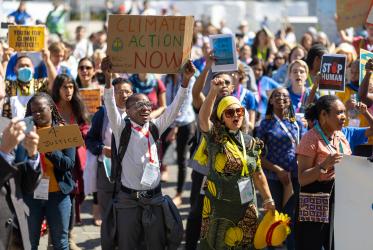Aid was sent, prayers and vigils organised, and even though the circumstances were extremely difficult, a lot has been done to ease the pain and help those in need. All the important global actors are trying their best. The same counts for the smaller ones and individuals. The question is, however, if we learn the lessons from the past concerning the climate crisis.
The Guardian painfully points out: "Humans, not just nature, caused this disaster" and "The lethal failures of the country’s authorities must bear much of the blame.” Once more in recent years, we are not seeing "a natural disaster" but a human-induced disaster caused by disrespecting the rules and failing to protect citizens—even the warnings about the coming disaster were insufficient, not to mention that some residents were asked to stay indoors and were being assured of safety. No further tools to warn and reduce the harm before the flooding struck were employed. This had reasons: Derna has been considered the centre of resistance and, already in the Muammar Gaddafi times, have been gradually deprived of basic infrastructure. Various organizations have been already signaling that channeling help towards the most affected areas may be politically motivated and finally not reach those who need the aid.
The justice issue here is so multi-level and stark in the Libyan case that it seems to be an emblematic example of the climate crisis. Not only do we see a population that has been treated unfairly for many years by the regime, but also the population that has been suffering from adverse weather conditions caused by climate change that they have contributed to in a very minimal way. The climate circumstances—even access to fresh water is dramatically difficult. To make the differences even more visible, it is well worth mentioning that the storm that affected Libya has also caused disruptions, for instance, in Greece but they were much less severe as the preparedness and reactions were on a whole different level. Any sort of national climate change strategy in Libya is absent—this also explains a lot. In a country torn by political conflicts and fights over power, issue of the highest importance has been immensely neglected and left apart.
The flooding in Libya, exacerbated by climate change, highlights our collective failure to safeguard the environment. It is a stark reminder that the consequences of our actions affect not only us but also those living on the margins of society.
In the midst of the pre-flood and post-flood chaos in Libya, the youth perspective emerges as a critical voice advocating for change and resilience. The plight of young Libyans in the face of climate change and its consequences cannot be ignored, and their access to education is a key concern. The disrupted learning environments caused by flooding not only deprive them of knowledge but also hinder their empowerment and prospects. Access to education is a fundamental right. The flooding exacerbates the existing inequalities, as schools are damaged or inaccessible, disproportionately affecting the most vulnerable communities. The international community's response, while commendable, must prioritize inclusive and accessible education for all, ensuring that young minds aren't left behind.
Non-discrimination and equality in education are paramount in rebuilding Libya post-flood. Discrimination in access to education, based on gender, ethnicity, or social status, must be addressed to create a just and resilient society. Young people are leading the charge, advocating for equal educational opportunities for all, irrespective of their background.
As climate change intensifies, it is crucial to heed the warnings of the youth who recognize that this disaster, like many others, is a result of human actions and inadequate governance. The youth demand accountability from authorities who failed to protect citizens and neglected climate change mitigation efforts. They call for a national climate change strategy that integrates environmental protection with social justice, recognizing that climate impacts hit the marginalized the hardest.
In the face of adversity, the youth of Libya exemplify resilience, determination, and a commitment to a more equitable and sustainable future. Their voices, advocating for education, empowerment, non-discrimination, and equality, should guide our collective response to the climate crisis, ensuring that no one is left behind in the wake of environmental disasters. But we know it right? We have seen situations of this kind so many times before.





